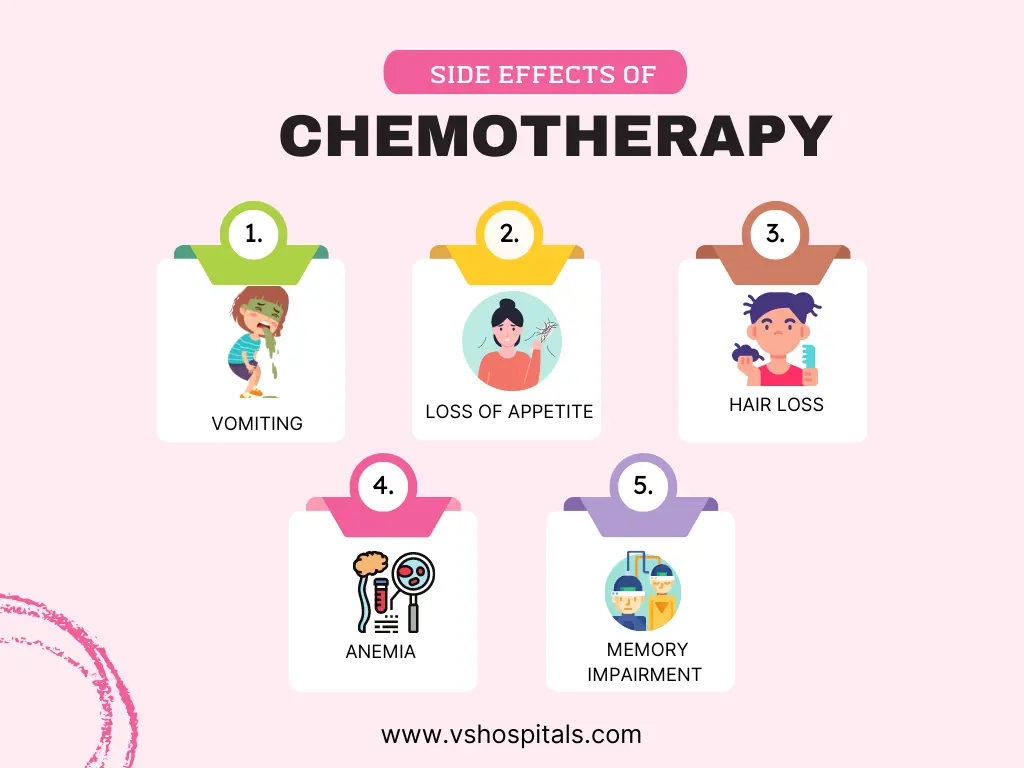Chemotherapy is a medical procedure that is commonly used for treating cancer. Even though chemo destroys the dividing cancerous cells rapidly in the body by making it healthy again, the journey to getting healthy is quite challenging as it is lined up with unwanted chemotherapy side effects.
Chemotherapy side effects
In most cases, feeling exhausted all the time, unexpected hair fall, unexplained bruises, and mouth sores are known to be the short-term side effects of chemotherapy. Nausea, vomiting, and weight loss can be other side effects among a lot of patients. In certain cases, a sudden fall in white cell count can also be witnessed because of chemotherapy for cancer.

Long-term side effects of chemotherapy
As we are aware that chemotherapy for cancer involves administering strong medicines to destroy cancer cells, and the medications may also adversely affect healthy body cells in the long term.
In general, the following side effects of chemotherapy can be seen in the long term:
- Nerve Damage – Chemotherapy for cancer may cause damage to nerve endings which results in tingling sensation, numbness, or pain in the hand or feet. The nerve damage can be permanent in some cases.
- Memory Problems – Although it is not among the common chemotherapy side effects, some patients experience memory loss or lose their ability to remember and concentrate.
- Chronic Fatigue – Many patients undergo fatigue, weakness, and chronic tiredness. the chemotherapy side effects. The patients can also complain of the same symptoms even after years of treatment.
- Cardiac Problems – Certain drugs in chemotherapy for cancer cause damage to the heart, especially during the treatment of breast cancer.
- Fertility Issues – In quite a few cases, chemotherapy side effects have affected fertility in men and women or it has affected the ability to enjoy sexual life.
- Menopausal Symptoms – Chemo usually affects the menstrual cycle resulting in early menopause.
- Leukemia – This is not a very common chemotherapy side effects but it can cause leukemia in the long run. This side effect during chemotherapy for cancer depends on the dosage of the drugs, the type of drugs administered, and the length of the treatment.
Things to do after chemotherapy for cancer
A person has to do the below-mentioned things in order to manage the side effects of chemotherapy and reduce the toll it takes on the body. They include:
- To prevent nausea and vomiting after chemotherapy for cancer, it is important to eat bland foods which are easily digested by the stomach. Preferably it can be eating small portions of meals 3 to 5 times a day.
- Stay healthy with a proper diet and stay active to fight the feeling of exhaustion or tiredness. You can go for a 10–15-minute walk in the open lawn or garden, at least once a day.
- Intake cream or honey before meals in order to overcome or reduce the pain caused by mouth sores. Also, it is essential to avoid spicy and hot food after the treatment of chemotherapy for cancer.
- Purchase wigs, hats, scarves, or other accessories to deal with hair loss as you will undergo these symptoms as chemotherapy side effects.
- Strictly avoid intake of alcohol or carbonated drinks and quit smoking as it can worsen the existing side effects of chemotherapy.
- Try eating cold food, fresh fruits, and vegetables to stay away from the kitchen and to avoid cooking.
- Participate in a support group after the treatment of chemotherapy for cancer to share the emotional trauma.
Furthermore, communicate effectively with the doctor and family members regarding the chemotherapy side effects, so that together you can come up with an action plan to manage it after the treatment of chemotherapy for cancer.
Read also Avoiding and Preventing Cancer.





